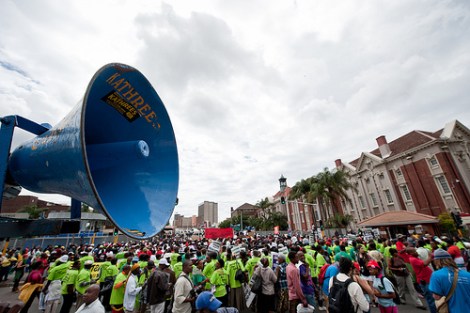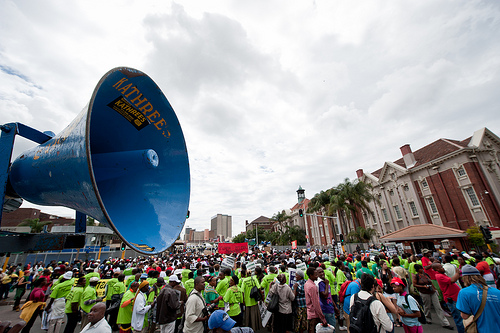Let’s just bring this out into the open, since I’ve made jokes about it in posts over the last two days: The U.N.’s annual climate change conferences — like next week’s, in Doha, Qatar — are pointless. They are very good for providing an excuse for the well-heeled to tour the world every winter, but they are fruitless in terms of adopting remedies for global warming and obviously ineffective in curtailing greenhouse gas pollution.
Disagree? Well then, I’ll play my trump card. You know who agrees with me? The United States government, that’s who.
Kind of; maybe — and not entirely because the U.N.’s process is ineffective. From Euractiv:
Since 1992, the United Nations Framework Convention on Climate Change (UNFCCC) has provided an umbrella for talks to curb global greenhouse gas emissions, and on 26 November, will host the COP18 Climate Summit in Qatar.
But it has been confirmed to EurActiv that Washington is increasingly looking to shift policy action to the [Major Economies Forum] whose members account for some 85% of global emissions, and which the US views as a more comfortable venue for agreeing climate goals.
If the idea gains traction, it could demote the UNFCCC to a forum for discussing the monitoring, reporting and verification of emissions reductions projects, sources say.
(Those “sources” are being generous with the UNFCCC’s current status.)

Protestors at COP17 in Durban, South Africa, 2011
Why try to negotiate deals with the Major Economies Forum on Energy and Climate (MEF) as opposed to the U.N.? In part, perhaps, because the smaller group of countries — primarily the world’s larger economies — could agree to environmental standards that ignore the concerns of developing countries. During last year’s U.N. talks in Durban, South Africa, developing nations threw a (completely justifiable) wrench in the works by suggesting that their efforts to curb carbon emissions required investment from larger countries. A MEF-moderated agreement wouldn’t have the voices of developing countries at the table.
The U.N. is not happy about the prospect of the U.S. sidestepping its gatherings, because obviously.
Brussels sees the MEF as a complement — rather than an alternative — to the UNFCCC, and is mindful of giving the newly-elected President Obama time to finesse his climate agenda.
It would be considered a “provocation” if the US was to unilaterally leave the UNFCCC process itself, sources say, and could potentially split the world into rival climate blocks led by Washington and Beijing.
Given the ineffectiveness of the U.N. process at building consensus and agreed-upon standards, much of this is dithering around the edges.
But President Obama’s current trip to Asia has resulted in at least some movement on environmental issues. This morning, the White House announced a new initiative to increase sustainable energy use in southeast Asia.
The [U.S.-Asia Pacific Comprehensive Partnership for a Sustainable Energy Future] will drive investment and facilitate progress on four key regional priorities: renewables and cleaner energy; markets and interconnectivity; the emerging role of natural gas; and sustainable development. … With an estimated $9 trillion needed in investment in electricity alone through 2035 to meet growing demand in the region, there is enormous potential for U.S. industry to play an important role in the region’s energy future.
The United States will provide up to $6 billion to support the Partnership …
This is a small step, but a smart one for the president: increase the market for American-made products and energy sources in an economic region that’s growing rapidly.
But, this is dithering around the edges on the opposite side of the issue. This initiative may slightly curb greenhouse gas emissions, but — true to the president’s comments last week — it puts the priority on business growth.
The world has no leader on climate change. The de facto leader, the U.N., is impotent; major powers like the U.S. and China won’t lead. So everyone works the edges of the huge, black clot of climate change. Its borders are discussed and occasionally buffed, but its primary mass just sits. Growing and growing. Casting a huge shadow.
Hat tip: Corbin Hiar



